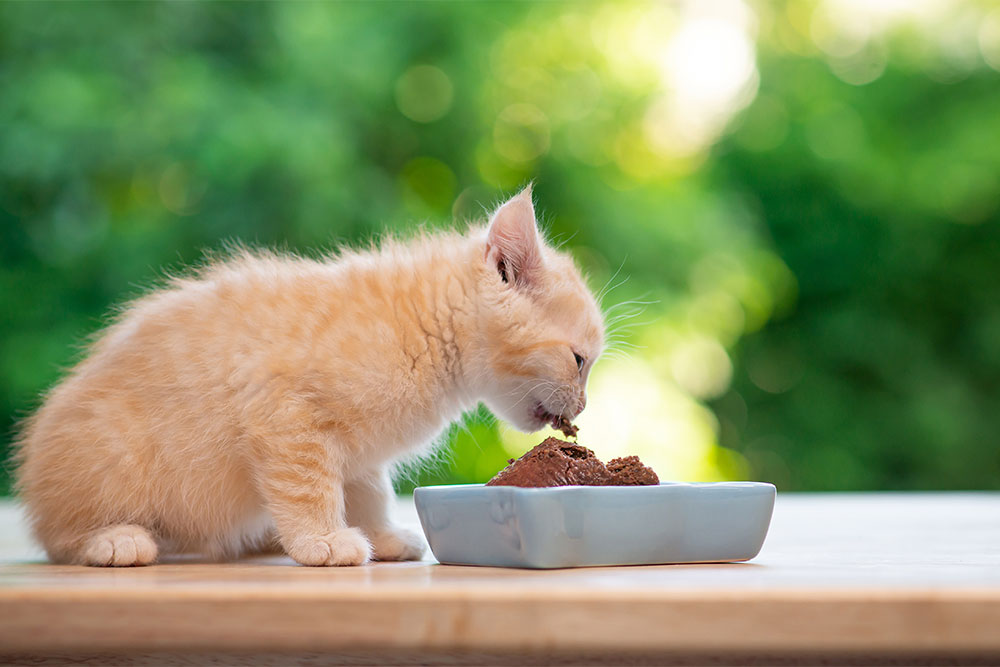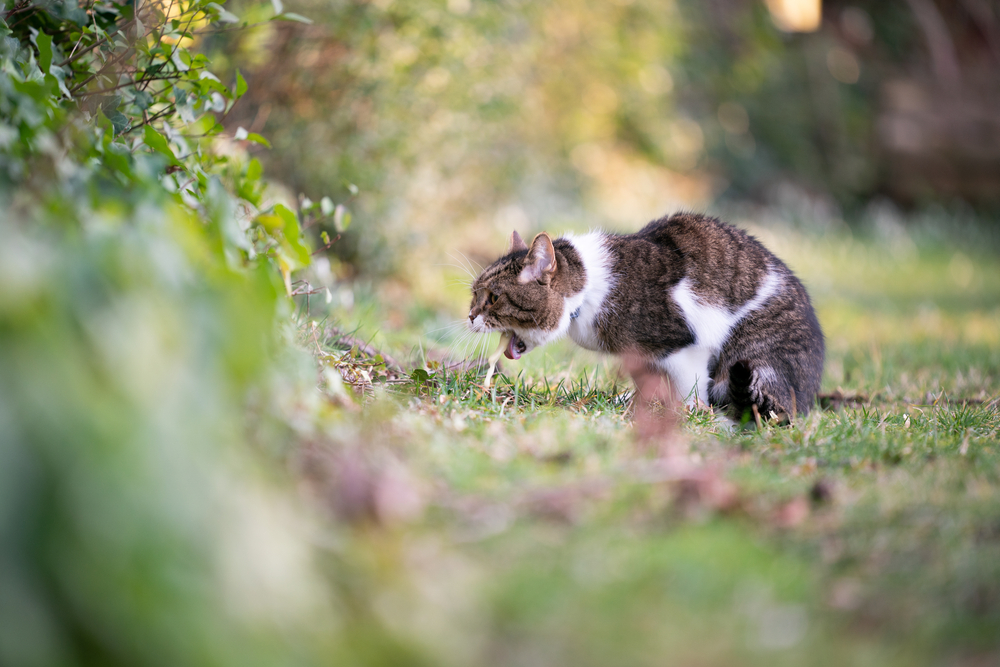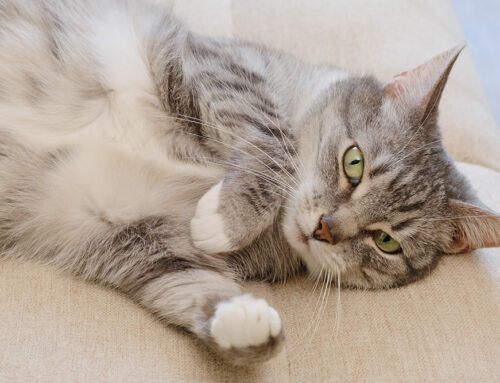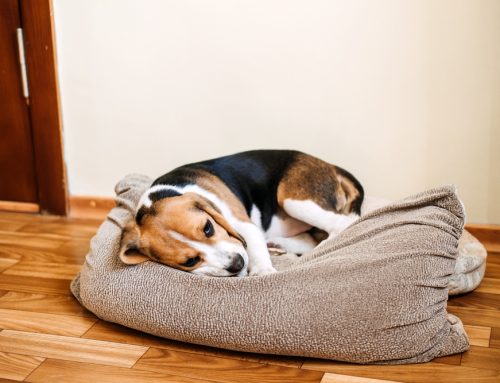At Willow Wood Animal Hospital, we understand how unsettling it is to see your cat vomit- especially when it happens more than once. Whether it’s a hairball on the carpet or an unexpected episode after a meal, vomiting can leave even seasoned cat owners wondering: Is this normal, or should I be concerned?
You’re not alone in that uncertainty- and we’re here to help.
What Is Vomiting in Cats- and Is It Normal?
Vomiting in cats is more than just an occasional nuisance. It’s a forceful expulsion of stomach contents, often triggered by irritation, illness, or even behavior. It’s important to distinguish vomiting from regurgitation– which is passive, typically undigested, and may happen right after eating.
While it’s never “normal”, some vomiting can be completely benign, such as the occasional hairball. But persistent or recurring vomiting often signals a deeper issue.
To better understand the physiology and medical context of feline vomiting, visit the Feline Vomiting – Cornell Feline Health Center.
Common Causes of Vomiting in Cats
Cats can vomit for many reasons- ranging from harmless to life-threatening. Some of the most common causes include:
1. Hairballs
While it’s normal for cats to groom themselves and occasionally expel hairballs, frequent episodes may indicate overgrooming or a digestive issue.
2. Dietary Indiscretion
Cats that eat too quickly, consume spoiled food, or ingest human snacks may suffer gastrointestinal upset. Sudden food changes can also trigger vomiting.
3. Parasites
Intestinal parasites like roundworms and hookworms can inflame the gut lining, leading to vomiting. Routine deworming and fecal tests help prevent this.
4. Infections
Viral or bacterial infections affecting the digestive tract are another common culprit- especially in kittens or outdoor cats.
5. Chronic Illnesses
Serious underlying issues like:
- Inflammatory Bowel Disease (IBD)
- Pancreatitis
- Kidney Disease (Chronic Kidney Disease in Cats)
- Hyperthyroidism (Feline Hyperthyroidism Guidelines – AAHA)
All of these can present with chronic or intermittent vomiting.
6. Foreign Body Ingestion
Ingested string, tinsel, hair ties, or other household items can obstruct the intestines. Learn more about gastrointestinal obstructions from ACVS.
Why Vomiting Shouldn’t Be Ignored
While a single, isolated incident of vomiting may not be cause for alarm, frequent vomiting can be a warning sign. Left unchecked, it can lead to:
- Dehydration
- Nutritional deficiencies
- Damage to the esophagus
- Development of chronic disease or worsening of an existing condition
Even if your cat seems “fine” afterward, repeated episodes deserve veterinary attention.
Signs and Symptoms to Watch Closely
Track not just the vomiting, but the context. Here’s what to monitor:
- Frequency: More than once or twice a week is not normal.
- Timing: Is it after meals, at night, or random?
- Appearance of Vomit: Is there blood, bile, or undigested food?
Use this guide to identify types of cat vomit – Purina
- Other Symptoms: Lethargy, diarrhea, hiding, decreased appetite, or sudden weight loss.
Learn to recognize lethargy in cats
Diagnosis: What Happens at the Vet
When you bring your cat to Willow Wood Animal Hospital, we start with a complete history and physical exam. Based on your cat’s symptoms, we may recommend:
- Bloodwork (to check for kidney, liver, and thyroid function)
- Fecal exam (to detect parasites)
- Urinalysis
- X-rays or ultrasound (to identify obstructions or organ changes)
- Endoscopy or biopsy if chronic conditions are suspected
Treatment Options: What to Expect
The cause of the vomiting will guide our treatment plan:
Mild or Occasional Vomiting
- Dietary modifications (switching to a sensitive stomach or limited-ingredient diet)
- Feeding smaller, more frequent meals
- Hairball control with regular grooming and fiber supplements
Moderate to Severe Vomiting
- Anti-nausea medication
- Antibiotics or anti-inflammatories (if infection or IBD is present)
- IV fluids and supportive care for dehydrated or lethargic cats
- Surgery if a foreign body or tumor is detected
Read more about exploratory surgery
Living with a Vomit-Prone Cat: Daily Life and Stress
Chronic vomiting affects more than your cat’s comfort- it can disrupt routines, trigger anxiety, and create tension in the home. Repeated messes, trips to the vet, and food experimentation add up, both emotionally and financially.
Prevention: Steps You Can Take Today
Preventing vomiting starts with awareness and small, consistent habits:
- Feed a balanced, high-quality diet
- Avoid sudden changes in food
- Brush your cat regularly to reduce hair ingestion
- Use slow-feeder bowls for cats who eat quickly
- Eliminate toxic plants and objects
Check ASPCA’s toxic plant list

Also consider:
- Probiotic supplements
- Elevated food bowls to aid digestion
- Environmental enrichment to reduce stress-related overgrooming
- Pet insurance and financial planning: Explore the real costs of cat ownership – ASPCA
At-Home Support During Vomiting Episodes
If your cat vomits occasionally and still seems bright and active, you can:
- Offer a bland meal (boiled chicken and rice)
- Provide plenty of fresh water
- Monitor stools and energy levels
- Reduce stressors and loud noises
Avoid giving over-the-counter or human medications unless specifically prescribed.
Preparing for a Veterinary Appointment
Before your visit, gather the following:
- A vomit sample (if available)
- Notes on frequency and triggers
- A list of current food, treats, and supplements
- Medication history
- Photos or videos of symptoms
Suggested questions to ask:
- What are the likely causes?
- Do we need imaging or lab tests?
- What are the treatment options?
- How will we monitor progress?
FAQs About Cat Vomiting
Is it normal for my cat to vomit hairballs?
Occasionally, yes. But frequent hairballs may indicate overgrooming, GI issues, or food intolerance.
When is vomiting an emergency?
If your cat is lethargic, not eating, or vomiting repeatedly within 24 hours, contact your vet immediately.
Can I give my cat Pepto-Bismol or other human meds?
No- some human medications can be toxic to cats. Always consult your vet first.
We’re Here When You’re Concerned
Vomiting is one of the most common (and confusing) concerns we see in feline patients- and we’re here to help you make sense of it. At Willow Wood Animal Hospital, our team is committed to compassionate, evidence-based care that supports your cat’s well-being and your peace of mind.
If you’re unsure whether your cat’s vomiting is something to worry about, don’t wait- contact us today. Let’s get your cat the answers- and the relief- they deserve.







Leave A Comment